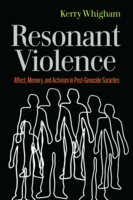The Politics of Genocide
From the Genocide Convention to the Responsibility to Protect
Resonant Violence
Affect, Memory, and Activism in Post-Genocide Societies
Resonant Violence explores both the enduring impacts of genocidal violence and the varied ways in which states and grassroots collectives respond to and transform this violence through memory practices and grassroots activism. By calling upon lessons from Germany, Poland, Argentina, and the Indigenous United States, Resonant Violence demonstrates how ordinary individuals come together to engage with a violent past to pave the way for a less violent future.
From Bureaucracy to Bullets
Extreme Domicide and the Right to Home
From Bureaucracy to Bullets uses eight compelling case studies—from five continents and spanning the 20th and 21st centuries—to explore the concept of extreme domicide, or the intentional destruction of home as a result of political violence. Moving beyond mere description, From Bureaucracy to Bullets identifies common factors that contribute to extreme domicide, thereby providing human rights actors with a framework to hold perpetrators accountable for their actions.
Memories before the State
Postwar Peru and the Place of Memory, Tolerance, and Social Inclusion
Korean "Comfort Women"
Military Brothels, Brutality, and the Redress Movement
Arguably the most brutal crime committed by the Japanese military during the Asia-Pacific war was the forced mobilization of 50,000 to 200,000 Asian women to military brothels to sexually serve Japanese soldiers. Korean “Comfort Women” explores Korean comfort women’s brutal experiences and their residual marriage, family, economic, and healthcare problems. It also examines the transnational redress movement, demonstrating that the Japanese government has tried to conceal the crime of sexual slavery by resolving the issue with money alone.
The Complexity of Evil
Perpetration and Genocide
Acts of Repair
Justice, Truth, and the Politics of Memory in Argentina
Acts of Repair explores how ordinary people grapple with decades of political violence and genocide in Argentina--a history that includes the Holocaust, the political repression of the 1976-1983 dictatorship, and the 1994 AMIA bombing.










